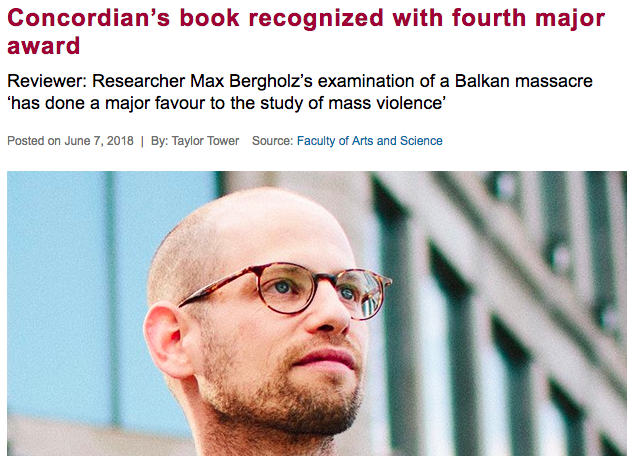BOOK | VIOLENCE AS A GENERATIVE FORCE
WINNER | 2019 Nanovic Institute for European Studies Laura Shannon Prize
WINNER | 2018 Council for European Studies' European Studies Book Award
WINNER | 2017 American Historical Association Herbert Baxter Adams Prize
WINNER | 2017 Association for the Study of Nationalities Harriman Rothschild Book Prize
FINALIST | 2017 Institute for the Study of Genocide's Raphael Lemkin Book Award
"A searing, original, and morally engaged study of violence in southeastern Europe during the Second World War. Combining archive-based microhistory, social scientific theory, and extensive fieldwork, Bergholz has created a work of scholarship that represents a state-of-the-art treatment of empirical research on nationalist violence. It bridges the gap between the humanities and the social sciences, between the study of the past and the analysis of contemporary politics, and reveals the ways in which the experience of violence shapes and transforms social relations in human communities. Violence as a Generative Force will stand alongside the work of Jan Gross and other major contributors to the understanding of social violence in local, multi-ethnic contexts."
— Association for the Study of Nationalities
"Max Bergholz’s Violence as a Generative Force moves confidently through critical debates about nationality, ethnicity, and “imagined communities” while never losing sight of its particular focus, the terrible story of intercommunity violence in Kulen Vakuf, a small town on the Bosnia-Croatia border, in 1941. His ability to show—at the most local level—how ethnic and national categories emerged when violence catalyzed social, political, and personal claims is a deeply impressive achievement of research and exposition."
— American Historical Association
"An extremely powerful book, excellent in every way: exhaustively (and courageously) researched; meticulously documented; well written and theoretically well informed. The author seeks to illuminate not just how ethnic conflicts break out, but also how some individuals and groups try to de-escalate, stop or prevent conflict. The former Yugoslavia has become known as a place where neighbor fought neighbor, but Bergholz argues that the perpetrators of atrocities were a minority, and that even at the worst of times there were those who were willing to step up to try to save civilians. This complicated story will chart new paths for future researchers of ethnicity and conflict."
Violence as a generative force
Identity, Nationalism, and Memory in a Balkan Community
Cornell University Press, 2016
During two terrifying days and nights in early September 1941, the lives of nearly two thousand men, women, and children were taken savagely by their neighbors in Kulen Vakuf, a small rural community straddling today's border between northwest Bosnia and Croatia. This frenzy—in which victims were butchered with farm tools, drowned in rivers, and thrown into deep vertical caves—was the culmination of a chain of local massacres that began earlier in the summer. In Violence as a Generative Force, Max Bergholz tells the story of the sudden and perplexing descent of this once peaceful multiethnic community into extreme violence. This deeply researched microhistory provides provocative insights to questions of global significance: What causes intercommunal violence? How does such violence between neighbors affect their identities and relations?
Contrary to a widely held view that sees nationalism leading to violence, Bergholz reveals how the upheavals wrought by local killing actually created dramatically new perceptions of ethnicity—of oneself, supposed "brothers," and those perceived as "others." As a consequence, the violence forged new communities, new forms and configurations of power, and new practices of nationalism. The history of this community was marked by an unexpected explosion of locally executed violence by the few, which functioned as a generative force in transforming the identities, relations, and lives of the many. The story of this largely unknown Balkan community in 1941 provides a powerful means through which to rethink fundamental assumptions about the interrelationships among ethnicity, nationalism, and violence, both during World War II and more broadly throughout the world.
MAKING OF THE BOOK
Laura Shannon Prize Lecture and Award Ceremony: Telling Histories of Violence Without Borders, University of Notre Dame, South Bend, IN.
Interview with Max Bergholz about Violence as a Generative Force at Seminary Co-op Bookstore, Chicago, IL.
Blog post by Max Bergholz on the making of Violence as a Generative Force.
Podcast interview with the New Books Network about Violence as a Generative Force.
Book lecture at The Herbert J. Ellison Center for Russian, East European and Central Asian Studies at the University of Washington, Seattle.
Article on designing the cover of Violence as a Generative Force.
Article on Max Bergholz winning the Joseph Rothschild Prize for his examination of a Balkan massacre.
Interview with Max Bergholz on the CBC’s Homerun with Sue Smith, aired live on March 7, 2019 at 5:40pm.
order book:
USA
CANADA
INTERNATIONAL





